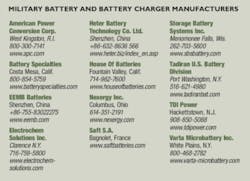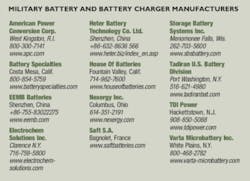Lithium batteries are still the choice to power manpack military gear
By John Keller
The digital battlefield and network-centric warfare are putting a premium on the value of batteries to power manpack communications equipment, handheld computers, navigation gear, and more. Battery manufacturers and distributors are hard at work to accommodate the latest versions of electronic combat devices.
Soldiers on the battlefield cannot use just any battery. They need portable power sources that discharge power quickly enough to keep their electronics running, that are light enough to carry into the field for extended missions, that contain enough total power to accommodate most missions, and that neither explode nor catch fire when damaged.
“What lithium can do is lighten the load of batteries to provide an adequate source of power that doesn’t burden the soldier with excess weight,” says John Costa, executive vice president for new business development at battery integrator Nexergy Inc. in Columbus, Ohio.
One of the most accepted and demanded battery chemistries for military manpack equipment is lithium sulfur dioxide—commonly simply referred to as lithium. This kind of battery is small, lightweight, and efficient enough for military applications in the field. Nearly as important is the lithium battery’s ability to function properly in temperature extremes.
“Alkaline batteries are not really used in the military because they don’t work well in cold temperatures,” explains Sol Jacobs, vice president and general manager of Tadiran Batteries in Port Washington, N.Y. “They also need a big battery pack.”
Lithium batteries contain three to four volts per cell, while Alkaline batteries have about 1.5 volts per cell, Jacobs says. Another big advantage of a lithium battery is its ability to maintain a charge over long periods of storage or dormant activity, which makes them appropriate for applications like unattended sensors, missiles, and smart munitions guidance, he says.
Tadiran’s TLM lithium batteries are commercial off-the-shelf (COTS), meet military shock and vibration guidelines, function in hot and cold temperatures, “and are much less expensive than custom-made batteries,” Jacob says. The batteries are non-toxic and non-pressurized, and have survived nail penetration and crush tests. “For the military, a bullet must be able to penetrate the pack without any extraordinary result—like a fire or explosion,” says Costa.
Lithium batteries also are the prevailing choice over rechargeable batteries for several reasons,” says Jacobs. Rechargeables are more expensive to buy, and do not have the power density of lithium, so battery packs must be larger and heavier.
null

